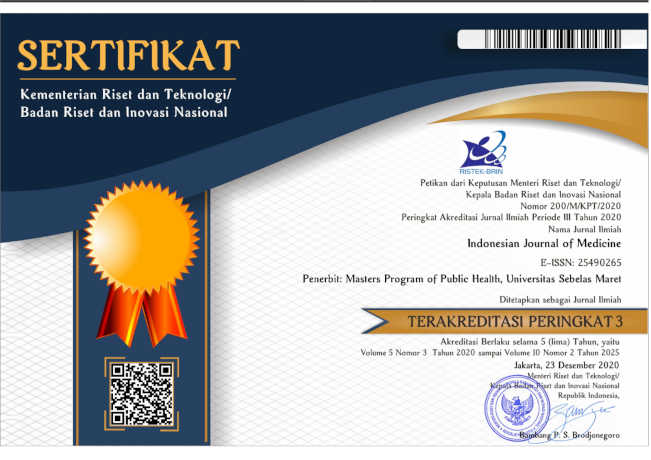Relationship between Family Support and Family Burden in Families With Cancer: Meta-Analysis
DOI:
https://doi.org/10.26911/theijmed.2023.8.2.613Abstract
Background: Cancer is a chronic disease caused by abnormal cell growth with special care needs that cause a burden on the family. Family support can have a significant impact on family burden. Adequate support from family members can lighten the burden on individuals or families and improve their overall well-being. This study aimed to estimate the relationship between family support on family burden in families with cancer obtained from several previous similar studies.
Subjects and Method: This research was conducted using a systematic review and meta-analysis with PICO namely, Population: family with cancer; Intervention: good family support; Comparison: Lack of family support; Outcome: family burden. By searching articles in 4 databases namely PubMed, Google Scholar, Science Direct, and ProQuest published from 2014 to 2022, entering the following keywords “Family support” OR “Supportive Family” AND “Family Burden” OR “Family depresssion” AND “Chronic Disease” AND “Cancer” AND “Multivariate Analysis”. Articles were selected using PRISMA flow and data analysis using the Review Manager 5.3 application.
Results: There 9 articles using the Cross-Sectional study design with a total sample of 2,832 subjects from India, Japan, USA, Swiss, Austria, Yunani, Germany, and Mexico which have been subject to systematic review and meta-analysis. The results showed that good family support are effective in decreasing family burden, and the results are statistically significant. Families with cancer who receive good family support are decrease family burden 0.57 times than families with cancer receive lack family support (aOR= 0.57; 95% CI= 0.38 to 0.85; p= 0.006).
Conclusion: Good family support are effective in decreasing family burden.
Keywords: family support, family burden, chronic disease, cancer.
Correspondence: Sang Ayu Made Adyani. Nursing Department, Faculty of Health, Universitas Pembangunan Nasional Veteran Jakarta. Jl. RS. Fatmawati Raya, Pd. Labu, Cilandak, Depok, West Java. Email: adyani.sangayu@upnvj.ac.id. Mobile: +62 819-3206-5946.
Indonesian Journal of Medicine (2023), 08(02): 169-178
https://doi.org/10.26911/theijmed.2023.08.02.06
References
Aflakseir A, Soltani S, Mollazadeh J (2018). Posttraumatic Growth, Meaningfulness, and Social Support in Women with Breast Cancer. Int. J Cancer Manag. 11(10): 11469. Doi: 10.5812/ijcm.11469
Amano K, Maeda I, Morita T, Okajima Y, Hama T, Aoyama M, Kizawa Y, et al. (2016). Eating-related distress and need for nutritional support of families of advanced cancer patients: a nationwide survey of bereaved family members. J Cachexia Sarcopenia Muscle. 7(5): 527–534. Doi: 10.1002/JCSM.12102
Friedemann, ML, Buckwalter K (2014). Family Caregiver Role and Burden Related to Gender and Family Relationships. J. Fam. Nurs. 20(3): 313–336. Doi: 10.1177/1074840714532715.
Govina O, Kotronoulas G, Mystakidou K, Katsaragakis S, Vlachou E, Patiraki E (2015). Effects of patient and personal demographic, clinical and psychosocial characteristics on the burden of family members caring for patients with advanced cancer in Greece. European Clin. J. Oncol. Nurs. 19(1): 81–88. Doi: 10.1016/J.EJON.2014.06.009
Horbar JD, Carpenter JH, Badger GJ, Kenny MJ, Soll RF, Morrow KA, Buzas JS (2012). Mortality and neonatal morbidity among infants 501 to 1500 grams from 2000 to 2009. Pediatrics. 129(6): 1019–1026. Doi: 10.1542/PEDS.20113028
Hu K, Martorell M, Daniela CU, Cho WC, SharifiRad J, Kumar AN, Fokou TP, et al. (2020). Lifestyle, Oxidative Stress, and Antioxidants: Back and Forth in the Pathophysiology of Chronic Diseases. Front. Physiol. 11. 694. Doi: 10.3389/fphys.2020.00694
MahrerImhof R, Jaggi S, Bonomo A, Hediger H, Eggenschwiler P, Krämer G, Oberholzer E (2013). Quality of life in adult patients with epilepsy and their family members. Seizure. 22(2): 128–135. Doi: 10.1016/J.SEIZURE.2012.11.012.
Mattoo SK, Nebhinani N, Kumar A, Basu D, Kulhara P(2013). Family burden with substance dependence: a study from India. Indian J. Med. Res. 704–711.
Mosher CE, Bakas T, Champion VL (2013). and Life Changes Among Family Caregivers of Patients With Lung Cancer. Oncology Nursing Forum. 40(1).
Oechsle K, Ullrich A, Marx G, Benze G, Heine J, Dickel LM, Zhang Y, et al. (2019). Psychological burden in family caregivers of patients with advanced cancer at initiation of specialist inpatient palliative care. BMC Palliative. Care. 18(102): 2–14. Doi: 10.1186/s1290401904697
Rock CL, Flatt SW, Byers TE, Colditz GA, DemarkWahnefried W, Ganz PA, Wolin KY, et al. (2015). Results of the Exercise and Nutrition to Enhance Recovery and Good Health for You (ENERGY) Trial: A Behavioral Weight Loss Intervention in Overweight or Obese Breast Cancer Survivors Listen to the podcast by Dr Ligibel at www.jco.org/podcasts. J. Clin Oncol. 33: 3169–3176. Doi: 10.1200/JCO.2015.61.1095
Schrank B, EbertVogel A, Amering M, Masel EK, Neubauer M, Watzke H, Zehetmayer S, et al. (2016). Gender differences in caregiver burden and its determinants in family members of terminally ill cancer patients. Psycho-oncology. 25(7): 808–814. Doi: 10.1002/PON.4005
Sercekus P, Besen DB, Gunusen NP, Edeer AD (2014). Experiences of family caregivers of cancer patients receiving chemotherapy. Asian Pac. J. Cancer Prev: APJCP. 15(12): 5063–5069. Doi: 10.7314/apjcp.2014.15.12.5063
Thakur KK, Bordoloi D, Kunnumakkara AB (2018). Alarming Burden of TripleNegative Breast Cancer in India. Clinical Breast Cancer. 18(3): e393–e399. Doi: 10.1016/J.CLBC.2017.07.013
ToledanoToledano F, Teresa DomínguezGuedea M (2019). Psychosocial factors related with caregiver burden among families of children with chronic conditions. Biopsychosocial. Med. 13(6): 2–9. Doi:10.1186/s1303001901472
Wang M, Brown R (2009). Family Quality of Life: A Framework for Policy and Social Service Provisions to Support Families of Children With Disabilities. 12(2): 144–167. Doi: 10.1080/10522150902874842.











